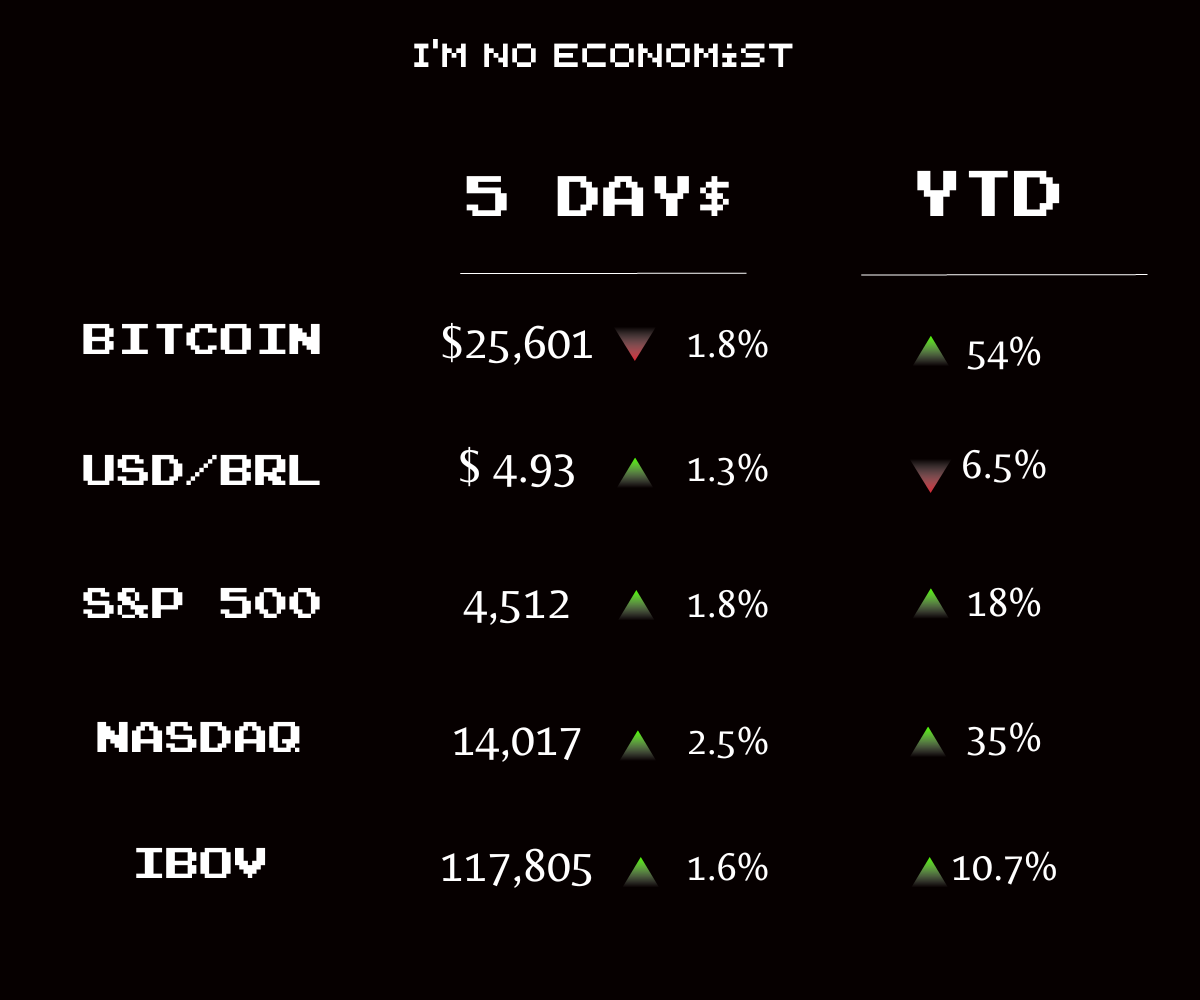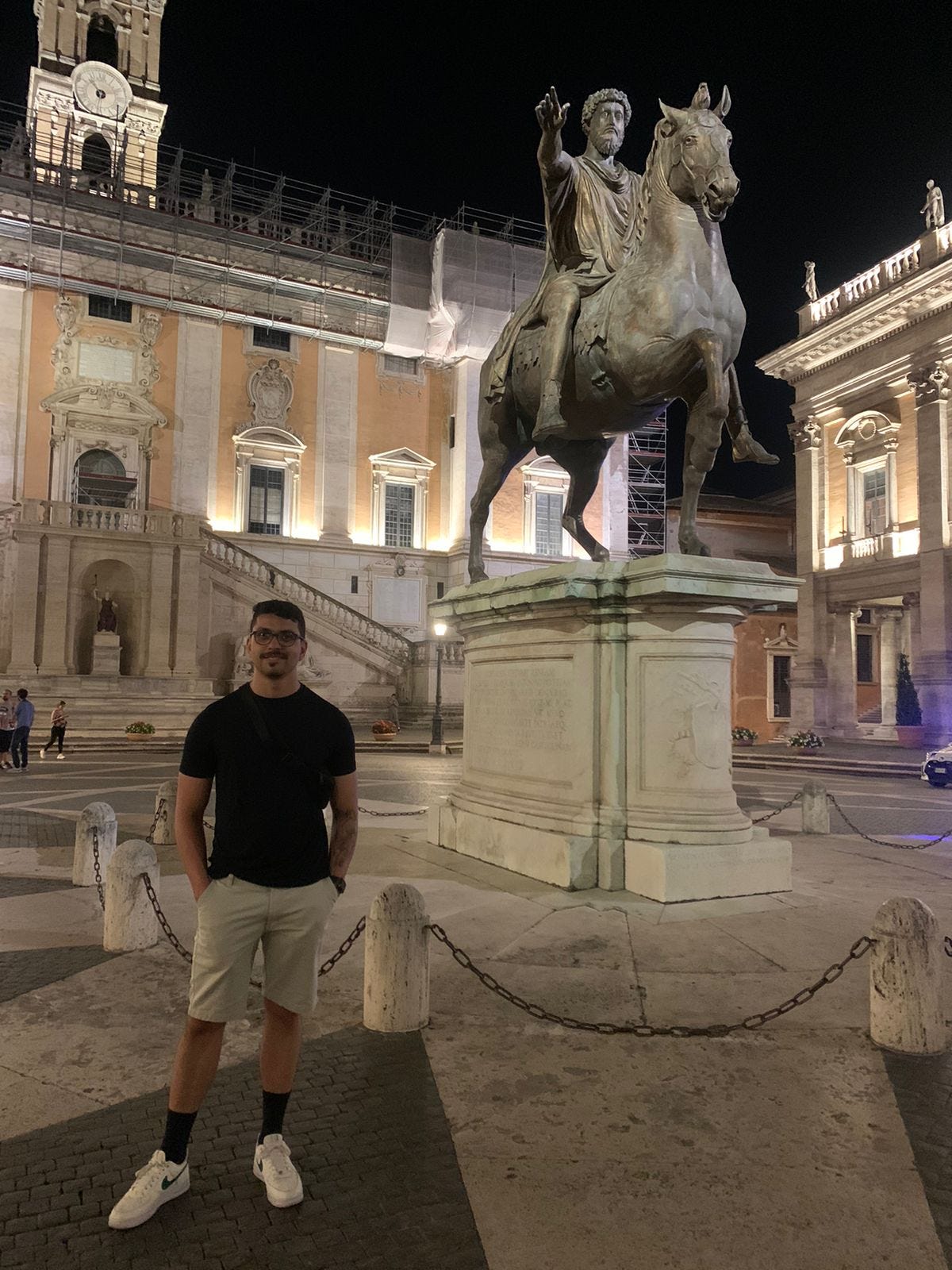🌊 Atlantico's 2023 Latam Report: You Probably Heard About #13 [I'm No Economist]
Atlantico's Latam Growth Report, Transfer of wealth, Our profit your loss, Are we back from the VC bear market?
Welcome to a new issue of You Probably Heard About 🎉
📈 Stay informed and ahead of the game with I'm No Economist weekly issues!
🔥 Every Friday, receive a comprehensive summary of big numbers, hot topics in finance and tech, and what's crucial to keep on your radar.
💡 If you'd like to get future issues and be in the know about the latest trends, subscribe today!
🥸 I'm No Economist is back
I was on vacation playing around with meme stocks while visiting 2,000-year-old archeological sites. I felt like I was doing too little and going too slow. So you can expect to see a lot more of I'm No Economist going forward.
I'll be more active on social media, sharing more insights on a daily basis while keeping a weekly frequency of You Probably Heard About issues.
Follow me on Linkedin & X.com to see what's shaking.
Also, here's a picture of one of the wisest men the Earth has ever had walking around its surface. And a statue of Marcus Aurelius too:
🌊 Atlantico's 2023 Latam Digital Transformation Report
The report deserves its own I'm No Economist deep dive, but I couldn't avoid mentioning it here on You Prob Heard About.
First, it would be weird not to mention simply because you probably heard about Atlantico's report from other sources - their marketing team is that amazing!
Second, this is an exceptionally comprehensive compilation and analysis of the main drivers of growth in the region.
The report that Atlantico titles "Tectonic Shifts” counts on 5 main pillars to explain Latam's growth:
Latin America: The Engine of the World
Digital Democratization
Renewal of the Entrepreneurial Spirit
Money Goes Digital
AI: The Great Equalizer
My favorite part? Their use of ChatGPT, Bard, and other Gen AI to introduce each chapter in the style of different artists, from novelists to songwriters and poets.
In the first chapter, they ask ChatGPT to write “A piece on the Engine of the World in the style of Clarice Lispector.”
Must read. Access the report here.
👴🏻 What's Bitcoin, Grandson?
Most family offices are not prepared for succession plans. I wrote about this here when I digested UBS's Global Family Office report.
The lack of succession plans is unsettling, especially because most of the world's wealth is in the hands of the Silent Generation and Baby Boomers. Moreover, the demographic and macroeconomic aspects of this transition are being overlooked.
I was reading an article by
where they point out how Bitcoin can benefit from this demographic shift.Most of the Boomers’ wealth is in family businesses and their homes. But since we have one of the highest interest rates of the past 15 years and the highest mortgage rates of the last 20 years, it's becoming increasingly hard for Millennials to build their wealth the same way their parents did.
Now, if you factor in that Millennials are generally digital natives, and have easier access to more liquid assets that can be bought without leveraging debt, it's sensible to predict that this money is moving to digital assets, such as Bitcoin.
Right now, this is how wealth is divided between generations:
Silent Generation (~86 years old): $18 tn
Baby Boomers (~66 years old): $78 tn
Generation X (~49 years old): $46 tn
Millennials (~33 years old): $13tn
Given that the average global life expectancy is 73 years old, it's best to prepare for a major shuffling in wealth among generations.
🤕 Are we gonna make it?
Private capital is rebounding, but we're not quite there yet. According to Pitchbook data, we're still - 30.9% YoY for all private asset classes (from private equity to VC, real estate, private debt, and more). For VC this number is -47% YoY.
That doesn't mean LPs have lost appetite, nor that they are bullying GPs into better terms. The number of funds charging management fees lower than 2% has in fact shrunk since 2017. But one thing that's been on everyone's mind though is the slowdown in liquidity events. Something that may improve with the IPO window slowly opening in the next few weeks and months.
Although there's still dry powder from funds holding capital for the best moment to invest, those exits can be a good indicator of future fundraising (for funds and companies) since everything is easier when you have cash in hand.
Apparently, we're gonna make it.
🥷 Our profit, your loss
The Brazilian government published an executive order to start taxing exclusive funds (those with a single investor, managed by professionals) that were initially opened with R$10M+ (~$2M). And a bill was also published to tax offshore funds outside of Brazil.
Different from what happens today, where taxation is only due if you have capital gains by selling your fund's quotas, the taxation will happen twice a year on a 15-20% cost for the fund's owner.
The government expects to gather R$23.8B (~$4.7B) by 2026. According to Ministério da Fazenda (Ministry of Finance), the money will be used to help reach the zero deficit goal in the treasury account in 2024 while covering the costs of raising the exemption for income tax payments. In the meantime, government spending continues to go up.
Live view from the Brazilian government right now:
🇧🇷 Brazil
Friday (today), September 1st
Q2 GDP growth (Previous 1.9% // Forecast 0.0% // Consensus 0.3%)
Annual GDP growth (Previous 4% // Forecast 2.5% // Consensus 2.7%)
Monday, September 4th
Monthly IPC-Fipe (Previous -0.14% // Forecast -0.02%)
🇺🇸 U.S.
Monday, September 4th
Optimism index (Previous 40.3 // Forecast 44)
Thursday, September 7th
Jobless claims (Previous 238k // Forecast 239k)
💌 If you like I'm No Economist, share it with a friend
I'm No Economist is a newsletter about global investment trends 💰
Here you'll read research digests and updates on what's going on in Venture Capital, Private Equity, and Global Macroeconomy - all subjects I'm fascinated with and have strong opinions about.
Talk soon,
L.










Once you get how our income-based labor force really works (that high profits depend on low wages), you will finally see and understand all the reasons why a global system that can match people to jobs, resources to communities, and everyday needs and demands to local production, consumption, and recycling operations is more sustainable and ethical than monetary methods practiced today, mainly because scientific-socialism, compared to scientific-capitalism, is actually more democratic; it values and views this very basic, very intuitive belief “universal protections for all” as both a human and environmental right.